Nicolaus Copernicus (1473-1543) was a Renaissance polymath and astronomer.
Contents
Copernicus, Kopernik or Kopernikus may also refer to:
Nicolaus Copernicus (1473-1543) was a Renaissance polymath and astronomer.
Copernicus, Kopernik or Kopernikus may also refer to:

Erasmus Reinhold was a German astronomer and mathematician, considered to be the most influential astronomical pedagogue of his generation. He was born and died in Saalfeld, Saxony.
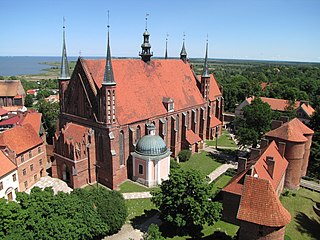
Frombork is a town in northern Poland, situated on the Vistula Lagoon in Braniewo County, within Warmian-Masurian Voivodeship. As of December 2021, it has a population of 2,260.

Johann Gottfried Galle was a German astronomer from Radis, Germany, at the Berlin Observatory who, on 23 September 1846, with the assistance of student Heinrich Louis d'Arrest, was the first person to view the planet Neptune and know what he was looking at. Urbain Le Verrier had predicted the existence and position of Neptune, and sent the coordinates to Galle, asking him to verify. Galle found Neptune in the same night he received Le Verrier's letter, within 1° of the predicted position. The discovery of Neptune is widely regarded as a dramatic validation of celestial mechanics, and is one of the most remarkable moments of 19th-century science.

Nicolaus Copernicus was a Renaissance polymath, active as a mathematician, astronomer, and Catholic canon, who formulated a model of the universe that placed the Sun rather than Earth at its center. In all likelihood, Copernicus developed his model independently of Aristarchus of Samos, an ancient Greek astronomer who had formulated such a model some eighteen centuries earlier.

Aleksander Wolszczan is a Polish astronomer. He is the co-discoverer of the first confirmed extrasolar planets and pulsar planets.

Bohdan Paczyński or Bohdan Paczynski was a Polish astronomer notable for his theories and work in the fields of stellar evolution, accretion discs, and gamma ray bursts. He is the recipient of the Eddington Medal (1987), the Henry Draper Medal (1997), the Gold Medal of the Royal Astronomical Society (1999), and the Order of Polonia Restituta (2007).
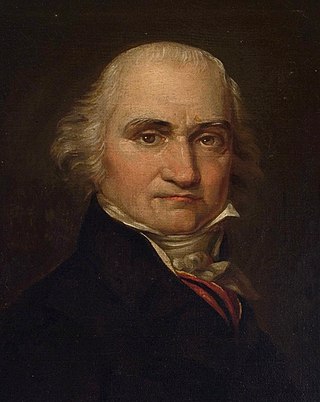
Jan Śniadecki was a Polish mathematician, philosopher, and astronomer at the turn of the 18th and 19th centuries.

The Kopernik Observatory & Science Center (KOSC), is a public observatory in Vestal, New York opened to the public on 16 June 1974 by the Kopernik Society of Broome County to commemorate the 500th anniversary of the birth of the astronomer Nicolaus Copernicus in 1973. Its mission is to offer hands-on investigations and outreach programs for educating all ages about astronomy and science using advanced optical telescopes, computers and other tools. It is the first science laboratory facility in New York State designed for K-12 teachers, students and their families, and has been one of the best-sited and best equipped public observatories in the Northeast United States for nearly the last 40 years.

The Cathedral Island is the oldest part of the city of Wrocław in south-western Poland. It was formerly an island between branches of the Oder River. Today it is the city's popular tourist destination.
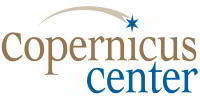
The Copernicus Foundation is a 501(c)(3) not for profit organization based in the Jefferson Park neighborhood of Chicago, Illinois.

Pszenno is a village in the administrative district of Gmina Świdnica, within Świdnica County, Lower Silesian Voivodeship, in south-western Poland.

The Science Picnic is Europe's largest outdoor science-popularization event organized jointly by Polish Radio and the Copernicus Science Centre. It has been held every year since 1997. A wide range of research fields are represented at the Picnic, including the hard, natural, and social sciences together with the humanities. Research and teaching institutions from Poland and abroad reveal here behind-the-scenes aspects of their work and present science in ways accessible to visitors of various ages, using hands-on experiments and interactive exhibits.

The Nicolaus Copernicus Monument in Warsaw is one of the Polish capital's notable landmarks. It stands before the Staszic Palace, the seat of the Polish Academy of Sciences on Krakowskie Przedmieście. Designed by Bertel Thorvaldsen in 1822, it was completed in 1830. Thorvaldsen's original plaster model from 1822 and a smaller study from 1821 are both held by the Thorvaldsen Museum in Copenhagen.
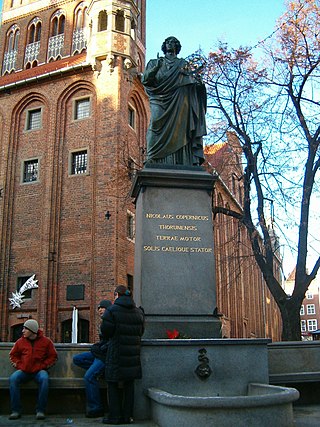
The Nicolaus Copernicus Monument in the home town of astronomer Nicolaus Copernicus (1473–1543) was erected in 1853 by a "monument committee" of the city's residents.
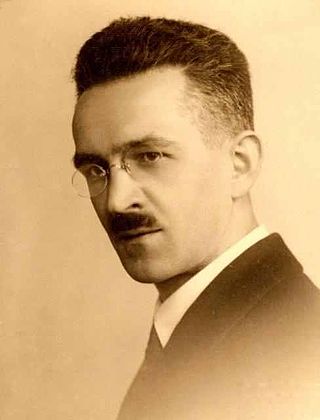
Aleksander Ludwik Birkenmajer was a Polish historian of exact sciences and philosophy, bibliologist, professor of the Jagiellonian University in Kraków and of the Warsaw University.
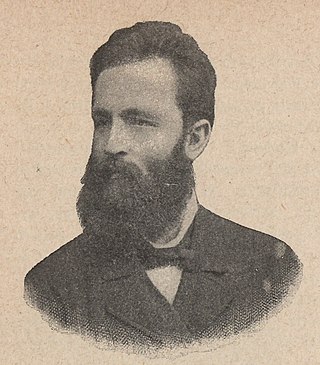
Ludwik Antoni Birkenmajer, Polish historian of science, physicist, astronomer, professor of the Jagiellonian University.

Astronomer Copernicus, or Conversations with God is a painting by the Polish artist Jan Matejko completed in 1873, in the collection of the Jagiellonian University, Kraków. It depicts Nicolaus Copernicus observing the heavens from a balcony in a tower with the cathedral in Frombork in the background. The canvas was purchased from a private owner by public subscription in Poland and hangs in the aula of the Collegium Novum of the university. Matejko produced the painting as part of a series of paintings intended to capture and represent key moments in the history of Poland to inspire the public.
Jerzy Sikorski is a Polish historian, Copernicologist, medievalist, museologist, author, publisher, journalist, and encyclopedist, who writes and publishes primarily in Polish. He is a resident of Olsztyn, Poland.
The Nicolaus Copernicus Polish-German Research Award is a biannual science award conferred by Deutsche Forschungsgemeinschaft and Foundation for Polish Science "to the individuals most active in Polish-German scientific cooperation who have made exceptional research achievements as a result of that cooperation." The award was established in 2006 and is named after Renaissance astronomer and polymath Nicolaus Copernicus (1473-1543). It carries a cash prize of €200,000 shared equally by two winners, one from Germany and one from Poland. In order to be eligible for the award, candidates must have at least a doctoral degree and work in Polish or German scientific institutions.

The Astronomical Observatory University of Warsaw is an institute that conducts astronomical research and teaching in astronomy. It is a part of Faculty of Physics University of Warsaw. The Observatory provides astronomy classes for BSc, MSc, and PhD students. Student telescope activities take place at the observing station in Ostrowik. The scientific research is conducted in a wide range of topics. Two main observing projects are long-term sky surveys: OGLE and ASAS. Both surveys take data using dedicated telescopes located at the Las Campanas Observatory, Chile. Scientific staff takes part in large astrophysical collaborations, both ground-based and satellite.